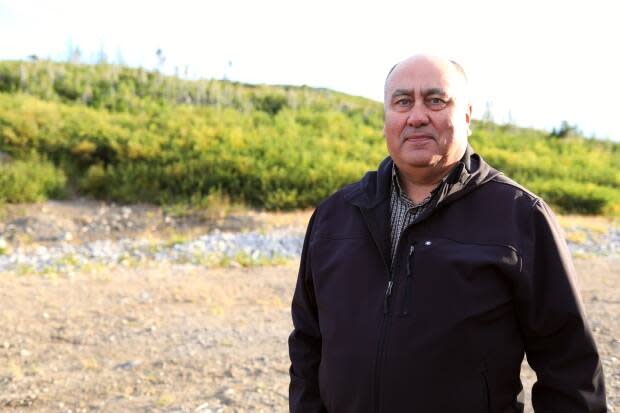Northern Labrador search and rescue co-ordinator calls for more radio coverage in mountain region

An ongoing inquiry into ground search and rescue in Newfoundland and Labrador is putting equipment shortages under the microscope.
Makkovik's search and rescue co-ordinator hopes that at the end of the inquiry, his team will have better VHF — or very high frequency — radio coverage to help people in distress in remote regions of Labrador's north coast.
Barry Andersen started with Makkovik's search and rescue group in 1994 after two young people were killed in a duck hunting accident and Andersen was left at work, unable to help search.
The community now has a team of 19 volunteers. Andersen, in his role as co-ordinator and community constable with the Makkovik RCMP, makes sure they follow proper procedures and are being safe and effective while searching.
"It's a small community. We have to look after ourselves," he said.
But it's not always possible to conduct a search mission across the peaks and valleys of the coastal landscape.
The Makkovik team was thrown into the national spotlight after 14-year-old Burton Winters went missing. Searchers took three days to find his body on the sea ice, and the federal government and military were criticized for their role in the search.
Burton's situation was the spark for the inquiry into ground search and rescue, which involved a weeklong hearing this month in Makkovik. The inquiry commissioner is now in Nain meeting with searchers before moving to more hearings on the island.
Andersen said he hopes the inquiry helps with "dead zones" in the region: places where VHF radio coverage doesn't reach. VHF is used by most ships but doesn't work well in the mountainous terrain of northern Labrador.
"As soon as you go down in the valley, the communications at the line of sight that the antennas require doesn't reach," Andersen said.
VHF radios are supposed to work up to about 64 kilometres, but if a person were in a valley being chased by a black bear less than a kilometre away, Andersen said, rescuers wouldn't know about it.
The Makkovik group has been lobbying the federal government and Canadian Coast Guard since 1998 for new VHF radios with better reception, Andersen said. However, he added, there's no legal obligation for government to provide it.
He also hopes the provincial government steps in with more funding in the wake of the SAR inquiry.
The Canadian Coast Guard said in a statement to CBC that their top priority is safety of mariners and protection of marine environment. It said there are five sites providing maring VHF in Labrador and in 2020, the Atlantic Region was asked by the Town of Makkovik for more coverage in the area.
It said the Canadian Coast Guard is exploring options to expand VHF coverage in Labrador.
"I've seen fishermen at the dock with their VHF radios taken apart, saying, 'My crystals aren't working properly,'" Andersen said. "There's nothing wrong with your VHF radio. There's no coverage here."
The Makkovik search and rescue team and Canadian Coast Guard auxiliary unit in Makkovik is expanding with a 28-foot vessel arriving later this fall. However, Andersen said that coverage is needed for them to hear emergency messages from the water so they can respond.
"We've already brought this to the attention in writing to the commissioner of the Atlantic area for the coast guard. So they're aware of it. They're pushing it up the line," Andersen said.
"Hopefully, we'll see some changes in the future."
CBC News has asked the Canadian Coast Guard and Fisheries and Oceans Canada, two agencies that share joint responsibility for radio coverage, for comment.

